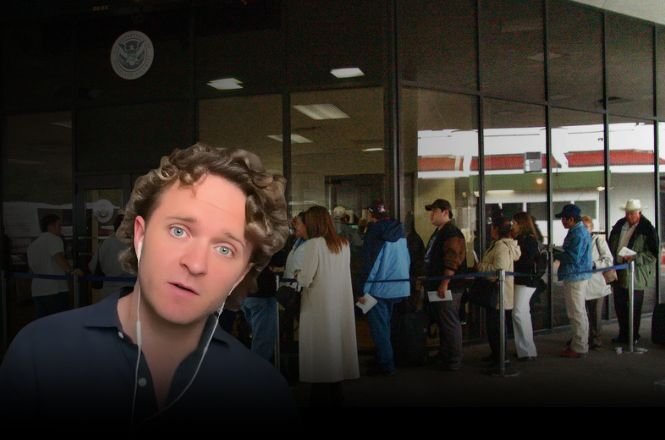Incident details
- Date of incident
- June 12, 2025
- Location
- Los Angeles, California
- Targets
- Alistair Kitchen (Independent)
- Border point
- Los Angeles International Airport
- Target nationality
- US citizenship status of target
- U.S. non-resident
- Denied entry?
- Yes
- Stopped previously?
- No
- Asked for device access?
- Yes
- Asked intrusive questions about work?
- Yes
Border Stop
- Equipment searched or seized
- Status of equipment
- Returned in full
- Search warrant obtained
- No
Equipment Search or Seizure

Australian writer and journalist Alistair Kitchen told the U.S. Press Freedom Tracker that Customs and Border Protection officers detained, searched and deported him on June 12, 2025, in Los Angeles.
Moments after Australian writer and journalist Alistair Kitchen stepped off a plane in Los Angeles, California, on June 12, 2025, U.S. Customs and Border Protection officers detained him, and later searched his phone and deported him.
After he was pulled from the customs line, one federal officer told him exactly why: “It’s because of what you wrote online about the protests at Columbia University.”
Columbia’s response to campus protests over the Israel-Gaza war has been under increased federal scrutiny since President Donald Trump’s inauguration. Kitchen, who attended Columbia on a student visa from 2022 to 2024 for a Master of Fine Arts program, had documented the April 2024 pro-Palestinian encampment at the university on his Substack.
While preparing for a two-week trip from Australia to the U.S. under the Visa Waiver Program — which allows people from certain countries to travel to the U.S. for less than 90 days — Kitchen told the U.S. Press Freedom Tracker he deleted sensitive content from his phone, including the Signal app, pictures and various texts.
He also removed the Columbia protest Substack posts at least three days before departure, but, he said, “It turns out they had already read them.”
When he arrived in the U.S., he expected a brief secondary check, but instead faced a pre-planned, intensive search.
“I was not prepared for what actually happened,” Kitchen said. “Which was them having pre-prepared for my arrival in the country and for my denial of entry.”
Australian writer and journalist Alistair Kitchen told the U.S. Press Freedom Tracker that he was deported after Customs and Border Protection officers targeted him for his reporting on the Columbia University student protests.
USPFT
Tired from a 15-hour flight, Kitchen was immediately placed in secondary processing. CBP officers seized his laptop and demanded the passcode for his cell phone under threat of deportation. He told the Tracker he reluctantly complied.
“This targeted, deliberate and quite intimidating approach really threw me,” he said. “It’s a high stress situation, and I was fatigued and fearful.”
Over several hours, officers pressed him for contacts in the student protest movement and began a detailed interrogation: Who had he spoken to at the protests? Where did he get his information? Which WhatsApp groups did he belong to? What was his take on the Israel-Palestine conflict, and how would he fix it?
“I was certainly present at many protests, but I saw myself there, first and foremost, as a journalist and as a writer,” Kitchen said. “I did not see myself as an activist. That distinction was not of interest to Customs and Border Protection.”
The lack of divisiveness in Kitchen’s responses did not seem to placate the officers, Kitchen recalled. He told the Tracker that they continued to dig for evidence that he was unfit to enter the country. Officers ran a forensic search of his phone.
After some time, a guard claimed they had found evidence of drug use on his phone but never showed it. Under pressure, Kitchen admitted to having used marijuana in New York, legal at the state level but illegal federally, which he had not declared on his visa application.
After 12 hours of detention — eight of which were spent in a basement holding cell at the airport — he was placed on a plane back to Australia without explanation or paperwork. The airline withheld his cell phone and passport from him until he landed in Melbourne.
“The drug use was used as a pretext to deny me entry for having views and having expressed views that the U.S. government does not want to hear,” said Kitchen, who asserts that his deportation has had the opposite effect. He added that he now feels emboldened to write “ferociously” about the protest movement and what is happening in Gaza.
“It’s pretty clear to me that the First Amendment protections of journalists and non-citizens are not nearly as firm as we’d like to believe,” Kitchen said. “It is only through a vibrant and loud public space in which journalists and non-journalists are able to express their views freely without the threat of intimidation that a democracy can survive.”
In a statement posted to its website, DHS said Kitchen was denied entry to the U.S. because he gave false information on his Electronic System for Travel Authorization application regarding drug use.
“Using the ESTA is a privilege, not a right, and only those who respect our laws and follow the proper procedures will be welcomed,” the statement said.
The U.S. Press Freedom Tracker catalogs press freedom violations in the United States. Email tips to [email protected].